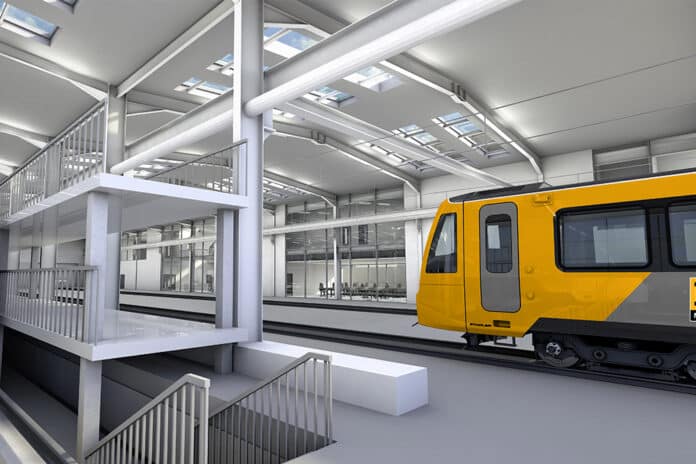Ahead of the arrival of new trains for the Tyne and Wear Metro, Stadler and construction partner, VolkerFitzpatrick, are making progress on the construction of a new depot, with the first stage of demolition now complete and work to build track foundations under way.
The state-of-the-art facility will accommodate the new fleet of trains, which will transform rail travel in the north east. Three depot roads and an area of the main depot building have been successfully removed, as part of the first of a four-part demolition process.
Work on the track beds has recently started and old tracks are being broken up and removed in preparation for the laying of foundations for the new tracks. The programme to build a new depot started last year and most of the construction is set to be completed by 2025.
During the recently completed phase of demolition, being undertaken by local north east firm, Thompsons of Prudhoe, waste material has been crushed for recycling, and will be used to build a road on the depot. This means that moving thousands of tonnes of stone by road has been avoided, highlighting Stadler’s green credentials and pledge to keeping Its carbon footprint to a minimum.
Next month, work will begin to build foundations for the new tracks, which will involve boring hollow steel tubes into the ground and filling them with concrete.
Foundation work on the main building will be carried out in July, and a second phase of demolition, involving the removal of an old stabling shed to the west of the depot, will take place later this year.
The final two stages of demolition will be in 2022 and 2023.
Rob Baxter, managing director of Stadler RailService UK, commented: “The project to build a new depot has been configured to enable the existing trains to continue successfully operating from it, while construction takes place.
“This is a challenge, but I am delighted that the project has maintained momentum despite the pandemic, and that so much progress has already been made.”
Metro Development Director, Neil Blagburn, said: “Excellent progress has been made getting the site ready for our new, £70m Metro fleet depot in Gosforth.
“The last few months has seen the partial demolition of the 100 year-old train shed, creating room to get the site ready for the new buildings and infrastructure. Approximately30 per cent, around four acres of the original depot’s sidings have been removed paving the way for the first foundations to start going in.
“The completed project will provide a modern new home for the new Metro train fleet. These are the first steps on a really historic journey that will secure the future of the Tyne and Wear Metro for many generations to come.
“Our thanks go to Stadler, VolkerFitzpatrick and Thompsons of Prudhoe for getting this phase of the project off to such a good start.
“The old depot buildings will be pulled down in phases over the next two years. We are storing up to a quarter of our current trains at our purpose built satellite depot in Howdon while the depot transformation takes place.”
Marcus Dench, VolkerFitzpatrick senior project manager, said: “Our team has made great progress so far, having completed phase one of the demolition works, and we are now ready to start works to install the foundations needed to support the depots new roads. We’d like to thank all parties involved, who have worked hard to not only ensure we comply with coronavirus restrictions, but who have also ensured that we keep the site as sustainable as possible.”
The new facility on the 12-acre site close to Regent Centre station will comprise inspection roads and pits, cranes, jacks, test facilities, automatic train-checking equipment and a wheel-lathe. It will feature a wash-plant to clean train exteriors and other dedicated areas for both daily and periodic deep-cleaning. The outside area will be adapted to optimise train movements, while keeping noise to a minimum for the benefit of local residents.
It is being designed to ensure maximum availability and reliability of the fleet for decades to come. It will vastly improve the working environment and become home to a wide range of activities, including preventative and corrective maintenance, overhauls and train presentation. There will be storage for spare parts and material supplies and office space for training and support functions.
The building will promote sustainability, providing an attractive environment for employees. It will make best use of natural light, and all workspaces will have windows. Energy efficient lighting will be installed throughout the premises and solar panels on the roof will reduce overall energy consumption. Water recycled on site and rainwater will be harvested and used for train washing facilities and toilets. There will be a dedicated, secure area for bikes, and showers will be provided for people cycling to and from work. Charging bays for electric cars will be installed.
Photo credit: Stadler



































 0113 2082620
0113 2082620 info@railbusinessdaily.com
info@railbusinessdaily.com 15 Mariner Court, Wakefield WF4 3FL
15 Mariner Court, Wakefield WF4 3FL

